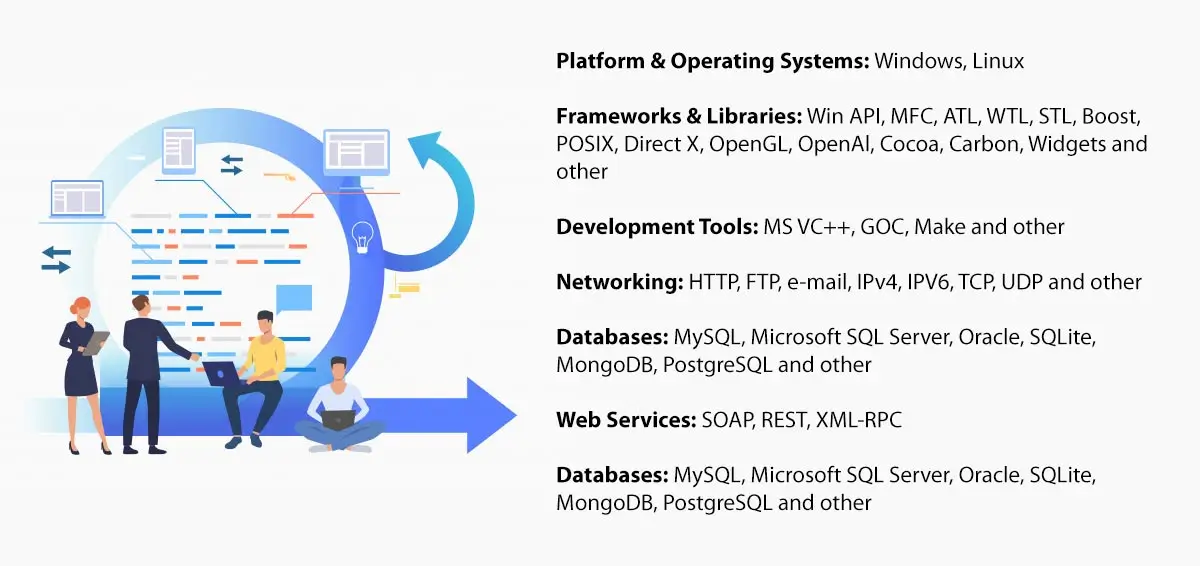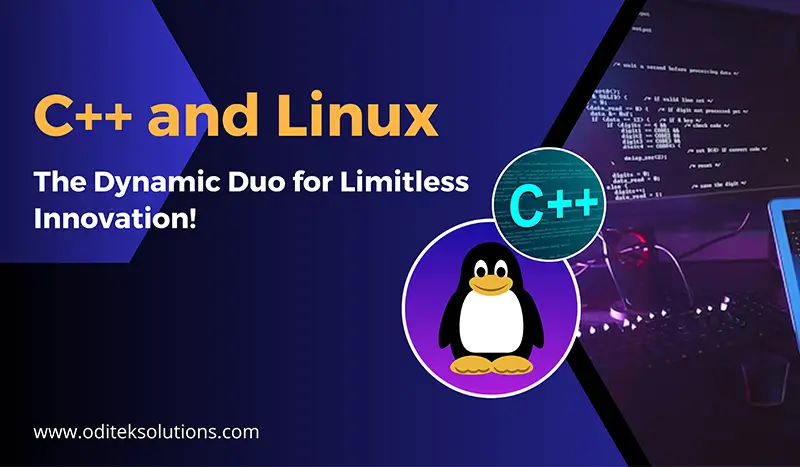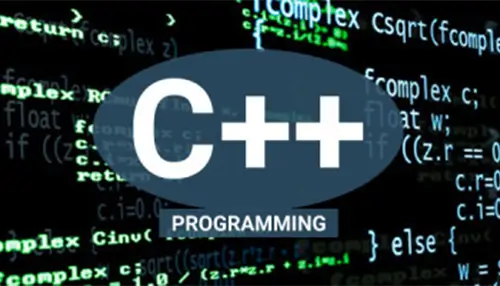C++ is a powerful programming language widely used for system-level development, game development, and high-performance applications. When it comes to C++ development, Linux is a popular choice among developers due to its flexibility, stability, and extensive toolset. In this blog, we will explore the best distributions for C++ development on Linux, discuss the process of developing C++ applications on Linux and macOS, and highlight some recommended Integrated Development Environments (IDEs) for C++ development on Linux.
C++ Development on Linux
To work with Linux or to go for C++ development on Linux you will need additional IDEs. You must be wondering why IDEs for Linux! The answer will be, Linux has several advantages and the biggest one is its security, because of which, the majority of the servers in the world are usually created using Linux.
Earlier, Linux was quite complicated as compared to Windows, but due to recent upgradations, it is now more user-friendly. It has become so flexible that any Windows user can easily switch to Linux.
Except for security, Linux is also open-source, free, and stable which makes it even a better choice for developers. In Linux, you can view and modify the source code as per your needs, unlike Windows. Furthermore, the best thing is that you don’t need to pay for anything. You can get to all the fundamentals and progressed programming with the expectation of complimentary which will limit your expense altogether.
Moreover, Linux isn’t inclined to crashes that make it exceptionally steady and quick. It has a colossal network for help, accompanies simple support, and is profoundly adjustable, and with on-going applications, it has gotten exceptionally simple to utilize.
Choosing the Best Distribution for C++ Development on Linux
Linux offers a multitude of distributions, each with its own strengths and target audience. Here are some of the best Linux distributions for C++ development-
1. Ubuntu
Ubuntu is one of the most popular Linux distributions, known for its user-friendly interface and strong community support. It provides a rich ecosystem for C++ development, with easy installation of development tools and libraries.
2. Fedora
Fedora is a cutting-edge Linux distribution that focuses on delivering the latest software versions. It offers a stable and up-to-date environment for C++ development, making it an excellent choice for developers who want access to the latest C++ features and libraries.
3. CentOS
CentOS is a stable and reliable Linux distribution derived from the same sources as Red Hat Enterprise Linux. It provides a solid foundation for C++ development, ensuring compatibility and long-term support for enterprise-level projects.
Developing C++ Applications on Linux
Developing C++ applications on Linux involves several key steps-
1. Setting up the Development Environment
After installing a suitable Linux distribution, developers need to install the necessary development tools. The GNU Compiler Collection (GCC) is a widely used compiler for C++ development on Linux. It includes the g++ compiler, which can compile and link C++ programs.
2. Managing Dependencies
Linux offers package management systems like apt, dnf, and yum, which simplify the installation and management of libraries and dependencies. These tools ensure that the required libraries are readily available and up to date.
3. Writing and Compiling C++ Code
Developers can use any text editor of their choice to write C++ code. Popular options include Vim, Emacs, and Visual Studio Code, which offer syntax highlighting and other useful features. Once the code is written, it can be compiled using the g++ compiler, which generates executable files.
4. Debugging and Profiling
Linux provides powerful debugging and profiling tools for C++ development. GDB (GNU Debugger) is a widely used command-line tool for debugging C++ applications. Profiling tools like Valgrind help identify performance bottlenecks and memory leaks.
Best C++ IDEs for Linux
At last, it’s an ideal opportunity to think about a portion of the top Linux IDEs and Code Editors utilized by software engineers in 2020 for C++ development. Your choice may vary while choosing the right IDE for as per your requirement because each one of them has sets of pros and cons. These are some of the best C++ development tools for Linux.
1.CLion
It is an exceptionally famous and intensely utilized IDE for C++ programming while at the same time utilizing Linux. It can likewise be utilized for Windows and Mac OS. This IDE is accessible in both free and paid forms (for business use). It has certain advantages that it supports all kinds of languages like HTML, CSS, and JavaScript, etc. It has numerous plug-ins and it is quite suitable for large scale projects. Apart from the advantages, it has quite a few disadvantages that it is not appropriate for beginners and it is a bit slow.
2.Eclipse
It is another notable C/C++ Linux IDE that is utilized consistently for programming. This IDE offers incredible GUI alongside drag and drops functionality to the clients. It comes convenient for the arrangement of interface components. Its advantages include high productivity, good debugging, compiling and syntax highlighting tool, effective for cross-platform, etc. Whereas it has certain disadvantages such as it is not appropriate for low-end employees, its file size is large and it is very difficult to add plug-ins here.
3.Visual Studio Code
VSC however evolved by Microsoft, can also be utilized for Linux OS for building up your C++ ventures. The help for C++ web development is given by a Microsoft C++ extension for all the stages. This code editor is notable for its blend of effortlessness and powerful developer tools. Other than VSC is exceptionally quick and is an alternative of decision for everyday utilization. However, its disadvantage is that it has a slow launch time and file search option, and it works as a code editor rather than an IDE.
4.NetBeans
It is another open-source tool for C/C++ development over Linux. NetBeans has picked up its notoriety among web engineers, as it also underpins PHP and front-end development. However, it is a decent IDE for C/C++ programming in Linux because of its document route and remote development features. In most cases, software engineers use NetBeans for C++ as well as Java language Development. Nonetheless, it has a few cons i.e. it is a very heavy software and it takes a lot of time to load.
5.EMACS
Emacs is a content tool that is known for its extensibility. It is exceptionally adjustable, free, and incredible and supports different platforms like Linux, Solaris, NetBSD, Mac, Windows, or others. It is packed with some eminent highlights that are preferred by developers everywhere all over the world. It is highly customizable and extensible. It also has additional content-sensitive editing mode. But it has certain disadvantages such as that you need to learn Emacs Lisp for making any customization and it isn’t accessible everywhere by default.
6.VIM Editor
This tool is a serious and exceptionally configurable word processor that is written in about VIM script and language. It is an ideal tool for a wide range of word processing, from altering configuration files to composing e-mails. It additionally offers many exciting highlights to Unix or Linux clients and is viewed as useful for programming in the C++ language. At first, it was essentially made for Unix. However, it now upholds different stages like Windows and others. It is a keyboard-based and mouse-free interface tool. It is very lightweight and performs fast operations. It is a great productivity tool. It has certain disadvantages as that it needs high effort to customize as well as it has poor feature discoverability.
7. Qt Creator
Qt Creator is an IDE specifically designed for developing applications using the Qt framework. It offers a range of features tailored to C++ development, such as Qt-specific code completion, visual design tools, and integrated debugging.
C++ Web Development
Web development refers to the building and maintenance of web applications and websites, It happens behind the scenes of an actual website to make the look, performance of a website attractive and simultaneously catering to seamless user experience. Web developers usually do this by a large variety of coding languages. The selection of languages to be used depends upon the types of tasks they are going to perform as well as the platforms on which they are working.
Web development is generally broken down into two fields such as front-end which means the user-facing side and the back-end or the server-side.
OdiTek’s C++ Services Offerings
Full-cycle C, C++ software development services from Oditek are tailored to specific requirements. Whether you are looking to develop, upgrade, modernize or support and maintain C, C++ based applications and product solutions, OdiTek’s development team has over 15 years of experience to efficiently assist you no matter what environments or development platforms you are using.
1. Custom Software and Application development
2. Maintenance and support of new or legacy applications developed in C, C# or C++
3. Development and optimization of high-performing software or product solutions
4. Cross-Platform Application development
5. C or C++ Server-Side Software development
6. Hardware-specific software solutions
7. Extensions, 3rd parties integrations and Plugins
Our C++ Expertise

Conclusion
Linux provides a stable and flexible platform for C++ development, supported by excellent distributions like Ubuntu, Fedora, and CentOS. C++ development on Linux involves setting up the environment, managing dependencies, writing and compiling code, and utilizing debugging and profiling tools. While Linux is the preferred choice, macOS also offers a strong development environment. IDEs like Visual Studio Code, CLion, and Qt Creator enhance the development experience.
At OdiTek, our team of experienced C++ developers specializes in Linux development, offering expertise in setting up the environment, optimizing code, and delivering efficient applications. Hire our skilled C++ developers from OdiTek for Linux development and unlock the full potential of C++ on this powerful platform.







